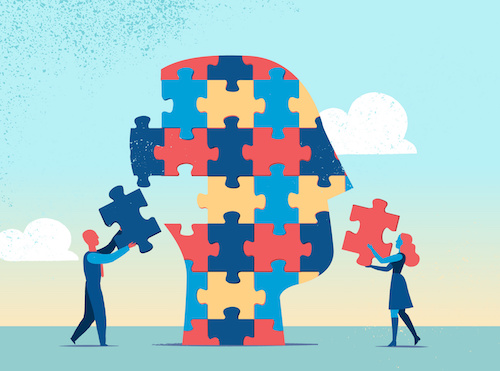January 11, 2019
By Elizabeth Drucker
 For a long time, I’ve struggled with my identity. During high school, how I felt about myself was reflective of whatever mood I happened to be in at the time. When I was manic, I saw myself as brilliant. I thought I was doing well enough to be admitted to the best, most elite universities. And, when I was depressed, I was certain that I was going to flunk out of high school altogether.
For a long time, I’ve struggled with my identity. During high school, how I felt about myself was reflective of whatever mood I happened to be in at the time. When I was manic, I saw myself as brilliant. I thought I was doing well enough to be admitted to the best, most elite universities. And, when I was depressed, I was certain that I was going to flunk out of high school altogether.
Then, I was diagnosed with bipolar disorder at the very end of my senior year. Many people with serious mental health conditions struggle to accept their diagnoses and the implications it means for their life—and I was no exception. It was so hard to realize that I was simply not like everyone else. I felt as if I was giving up my identity for one I didn’t want, “bipolar.” After receiving this diagnosis, I went through a grieving process. I had to accept the reality that I had a mental illness.
Integrating this diagnosis into my identity has been a process. I had to adjust to the changes that treatment and care of my condition meant for my life. For example, I didn’t want to take so many medications—even when my psychiatrist spent a great amount of time explaining that these pills were the only way for me to function properly. I understand now the importance of staying on track with medications in order to move forward in my recovery.
My symptoms worsened when I reached my twenties. My life consisted of: a maze of psychiatrist appointments, hospitalizations and taking handfuls of mood stabilizers and antipsychotics before I could go to sleep at night. It was hard to maintain relationships with other people, since I had such a shaky self-image.
While most of my peers were sampling college courses and charting their own paths to graduation, I struggled to keep myself out of the psychiatric hospital. For me, the hospital’s locked exits had become a revolving door. Somehow, my illness kept spinning out of control until I no longer recognized the person who stared back at me in that hospital bathroom mirror.
During the worst of my illness, I feared that I would never get better. Sitting in the emergency room—each time—waiting to be admitted to the psychiatric unit, I felt hopeless. If I was taking my medication, and they weren’t working, what did that say about my future? I saw that my friends had lives. They were studying for medical school entrance exams, hanging out in the student union and going to plays. While I lived a day-to-day existence. I couln’t plan ahead because I could never predict where my mental illness would take me.
For a long time, I believed that there was a magic bullet treatment out there for me. I didn’t really want to work on myself because, as much as I hated taking so many pills, I believed I would find thepill that would bring back my identity. Then I realized, whether I like it or not, my illness is a big part of my life, it is a part of my identity, and something that must be approached with proper treatment. I needed to build a healthy lifestyle from the ground up.
My recovery from bipolar disorder started with the constructive decisions I made about my overall health and my self perception. I now have a much better attitude about taking my medication and managing the side effects, like weight gain, as best as I can. Some days are so much harder than others. Once in a while, taking a walk around the block with my puppy will have to be enough. I have also noticed that exercise is helping me with the weight gain andmy mood. There were many times I screamed at doctors that they “didn’t understand me” when they suggested I exercise. But now, I find myself walking outside and being active on my own accord.
Working on getting my identity back has been hard. When you have a severe illness, you tend to notice that major difference between yourself and your peers. Many of my friends from college have started families, but I realize a pregnancy with bipolar disorder would be complicated for me right now.
More than anything, I’m thrilled just to be alive. I have experienced severe episodes that almost killed me. Thanks to excellent mental health care and my family and friends, I am getting my life back on my own terms. I am also developing an identity for myself that accommodates my bipolar disorder. But most importantly, my identity is “Elizabeth” not “bipolar.”
Elizabeth Drucker is a freelance writer from Chicago, Illinois. She has a BA in Sociology from the University of Arizona and a MS in Educational Leadership & Policy Analysis from the University of Wisconsin–Madison.
We’re always accepting submissions to the NAMI Blog! We feature the latest research, stories of recovery, ways to end stigma and strategies for living well with mental illness. Most importantly: We feature your voices.
Check out our Submission Guidelines for more information.
We’re always accepting submissions to the NAMI Blog! We feature the latest research, stories of recovery, ways to end stigma and strategies for living well with mental illness. Most importantly: We feature your voices.
LEARN MORENAMI HelpLine is available M-F, 10 a.m. – 10 p.m. ET. Call 800-950-6264,
text “NAMI” to 62640, or email. In a crisis, call or text 988 (24/7).